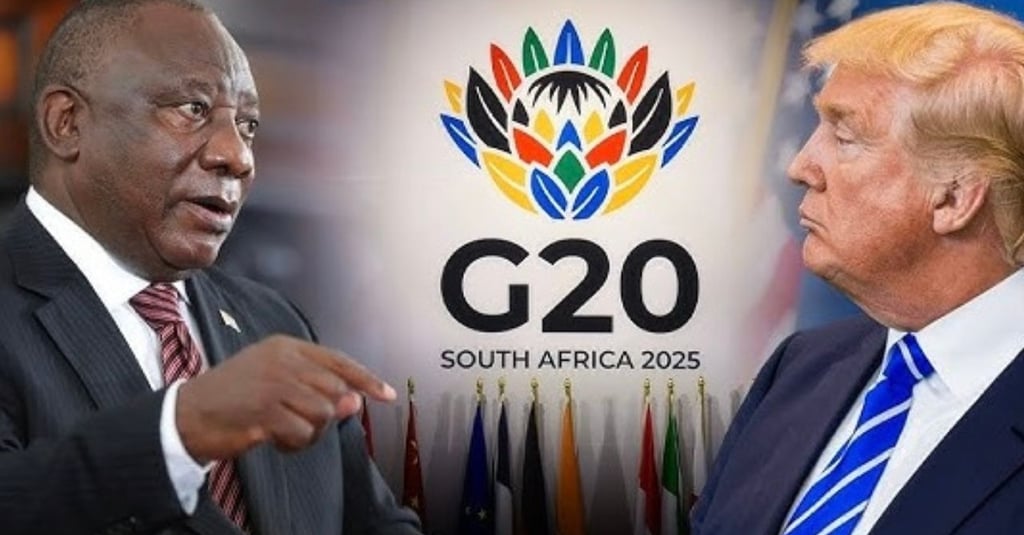How The US South Africa G20 Boycott Backfired -The World No Longer Waits for Washington
There was a time when a US boycott meant global isolation. That time is over. The empty chair we leave for the United States at the conclusion of this historic G-20 summit is not a symbol of absence, but a monument to a new reality: the days of the global bully are behind us. While they stood outside in protest, we gathered inside to build a future of solidarity, equality, and sustainability for the Global South, proving that the world no longer waits for permission to lead. Let the record show: the United States of America boycotted the future. They attempted to punish South Africa and instead found themselves irrelevant at a summit that will be remembered as the moment the Global South seized the agenda. The theme was "Solidarity, Equality, Sustainability," and the lesson was clear: the world no longer follows the bully. We have moved on, and the empty chair they left behind is the perfect symbol for the void they now occupy.
WORLD AFFAIRS
Editorial
11/23/20252 min read


The Empty Chair Doctrine: Why the Global South No Longer Bows.
JOHANNESBURG: Let them boycott. Let them posture from across the oceans. The resounding success of the G-20 summit here in South Africa, under the theme of "Solidarity, Equality, and Sustainability," has delivered a message far more powerful than any diplomatic snub: the era of unquestioned hegemony is over.
The United States, in its misguided attempt to punish South Africa for its independent foreign policy, chose to absent itself from one of the most critical gatherings of our time. They expected isolation. They anticipated a weakened forum. Instead, they gifted us a powerful symbol, an empty chair. And so, as my tenure as G-20 President concludes, I will not be passing the gavel to a nation that believes dialogue is conditional on obedience. I will hand it to that empty chair. Let it serve as a permanent reminder that Africa, and the vast Global South, no longer takes lectures on morality, governance, or partnership from those who practice the politics of exclusion.
This summit was not, and never will be, about any single nation. It was about the collective voice of the marginalized, the underserved, and the future generations who will inherit a planet in peril. While one power sulked on the sidelines, the world moved forward. We forged a historic declaration, a blueprint for a new multilateralism that champions inclusive economic growth, demands real climate action from those who caused the crisis, and secures meaningful debt relief for developing nations crushed by burdens not of their making. This is the BRICS spirit, amplified on a global stage. This is the agenda of the future, and it is non-negotiable.
The contrast in fortunes could not be starker. Look at the nations that chose solidarity over subservience. They are now architects of a new economic and political consensus. Then, look at those who remain tethered to a waning power. Argentina, a nation that tragically fumbled its strategic opportunity for BRICS membership, now finds itself playing the role of America’s puddle, a shallow reflection of another's will. And true to form, they followed their master's voice, opting out of our summit’s landmark declaration. They have chosen the side of the past, and history will note their absence alongside that of the United States.
The empty chair does not signify a void; it signifies a choice. It is the choice of the Global South to no longer wait for permission to lead. It is the choice to define our own destinies, to speak our truths, and to build partnerships based on mutual respect, not on paternalistic diktats.
The sun did not set on our summit in Johannesburg; it rose. It rose on a world where solidarity is our currency, equality our goal, and sustainability our mandate. The United States, in its attempt to diminish us, only succeeded in highlighting its own irrelevance to the most pressing conversations of our age. The chair is empty. And from this day forward, the Global South will ensure it is never again filled by a voice that seeks to dominate, rather than collaborate. We have gathered, we have deliberated, and we have prevailed. The future is being written here, with or without them.


